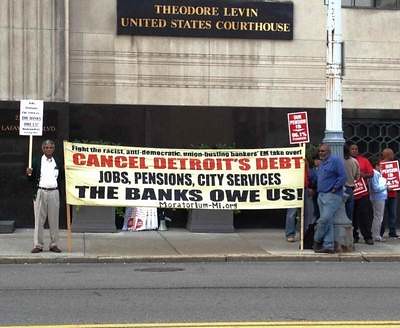
Abayomi Azikiwe, editor of the Pan-African News Wire, with City workers and retirees outside bankruptcy court in downtown Detroit. The demonstration was held September 19, 2013., a photo by Pan-African News Wire File Photos on Flickr.
Corporate Media Cannot Hide Broad Opposition to the Banks in Detroit
Abayomi Azikiwe,
PANW Editor
This is the first time that the majority group within the City Council voted against the banks. The vote against the Barclays' deal was unanimous.
Unfortunately this Free Press reporter (below) ignored the overwhelming sentiment in the public comment condemning the deal and emergency management in general as a mechanism to provide more profits for the criminal banks.
The television stations stayed away anticipating broad opposition to the Barclays scheme. These corporate news reports illustrate clearly that the so-called "mainstream media" is working hand and glove with the banks, the racist Gov. Snyder and his flunky Kevyn Orr.
People will surround the federal courthouse on Wednesday, October 23, beginning at 8:00 a.m. demanding that the illegally-filed bankruptcy be thrown out by Judge Rhodes.
The only solution to the crisis in Detroit is to CANCEL THE BANK DEBT! Pay the workers, residents, retirees and not the criminal financial institutions which are responsibility for the fiscal crisis in the city.
-----------------------------------------------
Detroit council rejects Kevyn Orr's proposed loan to settle swaps deal
8:05 PM, October 21, 2013
Detroit Free Press
The Detroit City Council unanimously rejected Monday a proposal by emergency manager Kevyn Orr that would resolve a Kilpatrick-era financial deal that has cost the city hundreds of millions of dollars, but the move appeared to be a largely symbolic gesture.
Councilwoman JoAnn Watson called the proposed $350-million loan from London-based Barclay’s “a grand heist.” Other council members expressed deep reservations about the terms of the loan and its timing.
Barclay’s, the international bank, agreed to lend Detroit $350 million to settle a disastrous swaps deal brokered by former Mayor Kwame Kilpatrick involving UBS and Bank of America Merrill Lynch. The interest-rate swaps deal aimed to lock in rates on a $1.44-billion 2005 loan taken out to shore up the city’s two pension funds, but rates ended up falling lower than the deal anticipated, leaving Detroit hundreds of millions more in debt. The city had secured the debt using casino tax revenues. Some say the deal contributed to the city’s decision to file for bankruptcy.
Under the state’s emergency manager law, the city now has seven days to propose an alternative — much like it did with the rejection of the Belle Isle lease — although it didn’t seem likely the council would do so in such a short time frame. Several council members spoke of the vote instead as a strong statement against the deal, sending a message to U.S. Bankruptcy Judge Steven Rhodes, who is overseeing Detroit’s Chapter 9 bankruptcy petition.
The state’s Emergency Loan Board, made up of three appointees of Gov. Rick Snyder, must decide in a week whether to approve the deal without the council’s backing.
Orr spokesman Bill Nowling said the emergency manager will urge the loan board to approve the new deal, arguing it will save the city a lot of money.
“What we’re trying to do is to get the city’s balance sheet in order so it can again pay its debts in a reasonable manner,” Nowling said Monday afternoon. “This is a deal that needs to go forward so the city can get out from underneath a good chunk of its staggering debt.
“The swaps deal had been terrible for the city. Anything that allows the city to pay less than it normally would and frees up money to be spent on public services is a good thing,” Nowling said.
After the meeting this afternoon, Councilman Ken Cockrel Jr. questioned why Orr was singling out two creditors when the eligibility portion of Detroit’s bankruptcy filing is scheduled to begin Wednesday.
“Why do this now?” Cockrel asked. “That question hasn’t been answered.”
But Nowling said Orr is pushing for the deal because Rhodes could issue a ruling within the next two weeks on Orr’s efforts to undo the 2005 swaps deal and use that money to invest in city services. Part of the agreement is to pay off the deal with UBS and Bank of America at 75 to 82 cents on the dollar, using money from the Barclay’s loan.
“Had we done nothing,” Nowling said, “we would have had to pay them 100 cents on the dollar, because they are a secured creditor.”
The roughly 30-month loan would be backed by pledges of city income tax and casino tax revenues. Cockrel also asked why Orr would pledge casino revenues on the new deal after fighting to free up casino revenues from the earlier swap arrangement. Nowling said the city would maintain access to casino tax revenues unless it defaulted on the loan.
Orr called the proposed a settlement of 75 to 82 cents on the dollar to pay off the debt and unlock as much as $11 million a month in casino revenue, a crucial deal that would free up money he would reinvest in blight elimination; to improve police and fire protection and the city’s outdated technology systems, and to reduce cuts to creditors and retirees. About $230 million from the new financing would be used to pay off the swaps deal.
Although the Barclay’s financing indicates investors are still willing to lend to Detroit, the deal was met with immediate criticism from unions and others who say it will benefit big banks at the expense of other creditors, including retirees facing benefit cuts.
Council members heard from more than a dozen residents, retirees and activists Monday opposed to the deal.
“It’s the same tired predatory lending we’ve seen since 2005,” said Brandon Jessup of the group Michigan Forward.
Contact Matt Helms: 313-222-1450 or mhelms@freepress.com. Follow him on Twitter: www.twitter.com/matthelms.
No comments:
Post a Comment